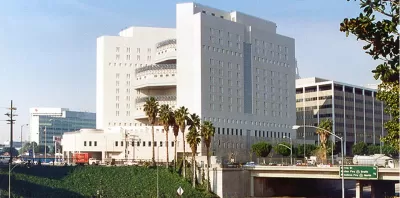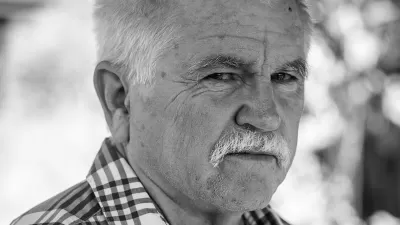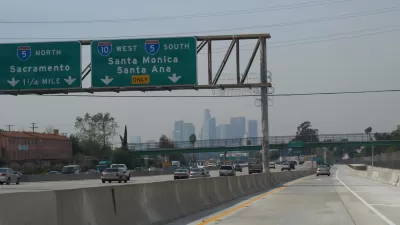The celebrated City of Quartz author speaks with the Los Angeles Times about activism, climate change, and his decision to stop cancer treatment.

Even while facing terminal cancer, iconic urban theorist and activist Mike Davis gave an expansive interview to Sam Dean of the Los Angeles Times, discussing everything from climate change to Bohemian Grove to death.
Davis is best known among urbanists for his 1990 book City of Quartz, a searing critique of corrupt Los Angeles institutions and carceral design and a prescient warning about the civil unrest that was to explode in the city just a few years later. “An astonishing run of more than a dozen books followed, oscillating between critiques and histories of the American West and sweeping historical analyses of how climate disaster, capitalism and colonialism have ground the global poor between their gears and set us up for future calamity (including global viral pandemics, predicted in 2005’s “The Monster at Our Door”).”
Dean describes Davis’ affable nature and generosity (“Our conversation lasted from midday until sunset”). Davis gives his opinion on climate change, fatalism, the LAPD, and the importance of organized social movements. For Davis, “the biggest single political problem in the United States right now has been the demoralization of tens of thousands, probably hundreds of thousands of young activists. Part of the problem is the lack of organizational structure, particularly of organizations of organizers.”
Davis concludes without wanting to leave any profound words about his own impending death. “I’m just an ordinary person going through what every ordinary person eventually goes through under circumstances that aren’t especially tragic at all.” For Davis, “ It’s been more fun just watching Golden State play or Scandinavian mysteries or reading books, above all relaxing and hanging out with the family.”
FULL STORY: Mike Davis is still a damn good storyteller

Maui's Vacation Rental Debate Turns Ugly
Verbal attacks, misinformation campaigns and fistfights plague a high-stakes debate to convert thousands of vacation rentals into long-term housing.

Planetizen Federal Action Tracker
A weekly monitor of how Trump’s orders and actions are impacting planners and planning in America.

In Urban Planning, AI Prompting Could be the New Design Thinking
Creativity has long been key to great urban design. What if we see AI as our new creative partner?

Florida Seniors Face Rising Homelessness Risk
High housing costs are pushing more seniors, many of them on a fixed income, into homelessness.

Massachusetts Budget Helps Close MBTA Budget Gap
The budget signed by Gov. Maura Healey includes $470 million in MBTA funding for the next fiscal year.

Milwaukee Launches Vision Zero Plan
Seven years after the city signed its Complete Streets Policy, the city is doubling down on its efforts to eliminate traffic deaths.
Urban Design for Planners 1: Software Tools
This six-course series explores essential urban design concepts using open source software and equips planners with the tools they need to participate fully in the urban design process.
Planning for Universal Design
Learn the tools for implementing Universal Design in planning regulations.
Gallatin County Department of Planning & Community Development
Heyer Gruel & Associates PA
JM Goldson LLC
City of Camden Redevelopment Agency
City of Astoria
Transportation Research & Education Center (TREC) at Portland State University
Jefferson Parish Government
Camden Redevelopment Agency
City of Claremont





























